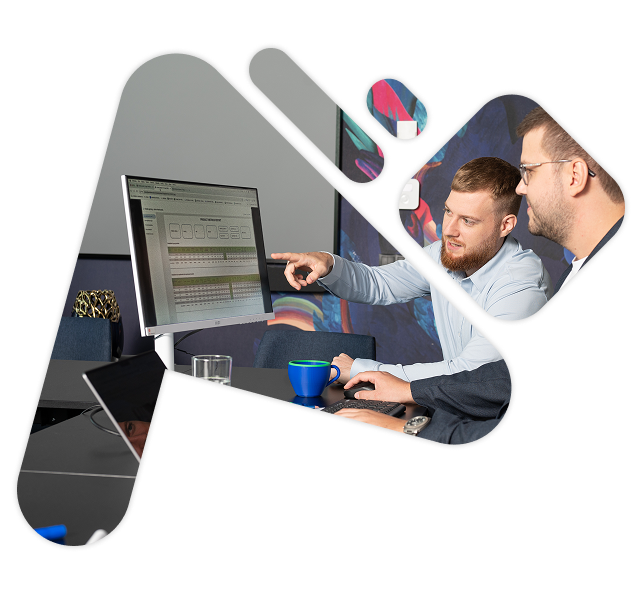Data Engineering Consulting Services
Thoughtful architecture means better data quality, efficient business processes, and a foundation for informed decisions.
Let’s talk
We empower leaders:










All your data in one place,
ready to work for you
Our data engineering consulting services provide the foundation for working with data. It involves a comprehensive data engineering process to create reliable, scalable architectures for data collection, processing, storage, and sharing to maximize its use.
Data integration from various sources
Collecting information through automation as part of data engineering projects improves data quality, eliminates data silos, and provides a complete and consistent view of the business. This enables better analysis and informed business decisions.
Scalability and Performance
Due to the scalability of data engineering solutions, the infrastructure adapts to a larger number of users and data without losing performance or processing speed.
Future-proof architecture
More data? No problem. Big data engineering services scale easily and are ready for increasing data volumes. You can also quickly expand them with new functionalities.
Quality through automation
Automation of data collection and processing, coupled with robust data governance, improves data quality and frees up time and resources within the organization, leading to greater efficiency in its operations.
One source of truth
Data ingestion ensures that having all data in one place provides reliable, consistent insights with the right metrics always available to the right people at the right time.
Savings through the cloud
Thanks to cloud solutions, you pay flexibly for the resources used in enterprise data lake engineering services, avoiding the need for excess infrastructure during sudden demand surges.

Do you want to manage your data better?
Let’s talkCreate a modern data-driven company where data helps you make better decisions.
Our engineering services automate processes, remove integration barriers, and optimize data pipelines and workflow efficiency. Each solution is precisely tailored to the client’s business needs, goals, and the specifics of their organization.

Data Integration
Integrating information and the systems from which it originates provides companies with a complete and consistent view of processes, increases efficiency, and reduces operational costs associated with manual data processing.
Learn moreData Warehouse Migration to Cloud
Our cloud migration solutions improve the scalability, flexibility, and performance of your data engineering systems, and reduces system operational costs. We ensure seamless data migration, enhancing data storage and processing capabilities to optimize efficiency and drive better business outcomes.
Learn moreArchitecture Design
A well-designed architecture design enables the creation of efficient infrastructure and effective data platforms for processing, storage, and management. It also facilitates the integration of information from various sources, reduces the risk of downtime, and optimizes costs.
Learn moreData Warehouses Development
A data warehouse implementation enables the consolidation of information from various sources into one central location, making analysis and reporting easier and providing faster, more accurate insights into the organization’s operations.
Learn moreData Modeling
Through data structuring and organization, it becomes easier to understand and effectively use data for creating detailed analyses and insights. This enables better data management, error avoidance, and faster information analysis.
Learn moreData Warehouse Optimization
Optimization helps reduce costs for data storage and processing by better managing resources and using pay-per-use models based on actual BigQuery utilization.
Learn moreData App Development
We create dedicated data applications that automate processes, perform analyses, and visualize results. This transforms raw data into actionable insights, enhances business efficiency, and supports innovation.
Learn moreEfficient data engineering, step by step
1. Analyzing the goals and needs of the client
• Checking which areas require support
• Developing requirements
• Examining the existing data infrastructure
• Presenting possible solutions
2. Designing the architecture
• Estimating the costs of implementation and maintenance
• Choosing strategies for data loading and transfer
• Ensuring the security of transmitted data
• Assisting in configuring network settings and access
• Presenting preliminary solutions
3. Integrating company data
• Identifying data sources
• Collecting information from client sources
• Creating processes for automatic data retrieval
4. Building the data warehouse
• Loading data from company sources
• Cleaning data and creating a single source of truth
• Modeling data
• Automating data processing workflows
5. Delivering the solution
• Providing documentation
• Testing the platform
• Onboarding
6. Optimizing and implementing feedback
• Collecting feedback from stakeholders
• Optimizing the solution for performance and cost-efficiency
• Providing post-sales support
• Implementing solution support upon client request
Discover our clients’ success stories

We helped Celsium build a data warehouse that reduced costs by PLN 180,000 per year
We integrated data from meters, SCADA, billing, and weather systems into a single data warehouse on Google Cloud Platform. We created advanced ETL processes, data quality control mechanisms, and dashboards in Tableau to support daily analysis of heat production and consumption.
The result? Meter failures detected in one day (previously one month), operational data updated three times a day, and significant savings thanks to heat source optimization and better demand balancing.

We built a modern data warehouse in GCP for PŚO
We helped Polski Światłowód Otwarty design and implement a scalable Data Lake architecture on Google Cloud Platform. We integrated 13 data sources, created automated ELT processes, access security, and a data model that serves as a single source of truth within the organization.
The result? Independence in reporting, rapid integration of new systems, readiness for future needs, and cost savings by eliminating on-premise infrastructure.

We helped AMS leverage data from DOOH media and maintain its position as a leader in outdoor advertising
We built a modern data ecosystem for AMS, a leader in OOH and DOOH advertising. We combined data from media, internal systems, Proxi.cloud, and CitiesAI to create a unified data warehouse in BigQuery with near real-time analysis.
The result? Data-driven targeting, campaign automation, better results for customers, and a stronger market position thanks to programmatic buying based on actual reach.

We helped Tutlo automate data integration and build a modern real-time ETL
In collaboration with the Tutlo team, we designed and implemented a data integration architecture based on serverless Google Cloud components. The system enables data synchronization from dozens of sources—including CRM—with full monitoring, CI/CD automation, and readiness for further scalability.
The result? A stable and flexible data ecosystem, ready for process automation, ML projects, and dynamic development of the educational platform.

We helped FunCraft forecast ROI and optimize UA budgets in the mobile gaming industry
We implemented a comprehensive BI solution for an American game studio, integrating data from Adjust, stores, and advertising platforms into the BigQuery warehouse. We built advanced dashboards in Looker Studio and predictive ROI models that enable accurate budget decisions—even with a long return on investment cycle.
The result? The FunCraft marketing team works faster, more efficiently, and with full control over their data.
Why choose Alterdata for Data Engineering?
Tailored services
We create data engineering services and solutions precisely tailored to your requirements and budget.
Our engineers take into account your industry, company size, goals, and other important factors.
A team of professionals
Our data engineers and analysts are highly skilled in delivering advanced data science and big data engineering services across industries.
For each project, we select specialists who understand your requirements.
A wide tech-stack
We use modern data engineering solutions and efficient technologies, selecting them based on needs to achieve goals in the most effective way.
This allows us to build platforms perfectly tailored to our clients’ needs.
Data team as a service
You receive support from a dedicated team of experts, available whenever you need them.
This also includes assistance with expanding your architecture and training your employees.
Data security
As a professional data engineering company we work in your environment and do not extract any data from it, ensuring its security.
You decide which information we have access to during our work.
End-to-end implementation
We provide comprehensive support and ongoing assistance at every stage of the lifecycle of our solutions. Our data engineering experts ensure seamless integration, scalability, and performance optimization.
After implementation, we support maintenance, development, and the addition of new features, helping you continuously enhance your data infrastructure and analytics capabilities.
Discover how data improves performance
Tech stack: the foundation of
our work
Discover the tools and technologies that power the solutions created by Alterdata.

Google Cloud Storage enables data storage in the cloud and provides high performance, offering flexible management of large datasets. It ensures easy data access and supports advanced analytics.

Azure Data Lake Storage is a service for storing and analyzing structured and unstructured data in the cloud, created by Microsoft. Data Lake Storage is scalable and supports various data formats.

Amazon S3 is a cloud service for securely storing data with virtually unlimited scalability. It is efficient, ensures consistency, and provides easy access to data.

Databricks is a cloud-based analytics platform that combines data engineering, data analysis, machine learning, and predictive models. It processes large datasets with high efficiency.

Microsoft Fabric is an integrated analytics environment that combines various tools such as Power BI, Data Factory, and Synapse. The platform supports the entire data lifecycle, including integration, processing, analysis, and visualization of results.

Google BigLake is a service that combines the features of both data warehouses and data lakes, making it easier to manage data in various formats and locations. It also allows processing large datasets without the need to move them between systems.

Google Cloud Dataflow is a data processing service based on Apache Beam. It supports distributed data processing in real-time and advanced analytics.

Azure Data Factory is a cloud-based data integration service that automates data flows and orchestrates processing tasks. It enables seamless integration of data from both cloud and on-premises sources for processing within a single environment.

Apache Kafka processes real-time data streams and supports the management of large volumes of data from various sources. It enables the analysis of events immediately after they occur.

Pub/Sub is used for messaging between applications, real-time data stream processing, analysis, and message queue creation. It integrates well with microservices and event-driven architectures (EDA).
Google Cloud Run supports containerized applications in a scalable and automated way, optimizing costs and resources. It allows flexible and efficient management of cloud applications, reducing the workload.

Azure Functions is another serverless solution that runs code in response to events, eliminating the need for server management. Its other advantages include the ability to automate processes and integrate various services.

AWS Lambda is an event-driven, serverless Function as a Service (FaaS) that enables automatic execution of code in response to events. It allows running applications without server infrastructure.

Azure App Service is a cloud platform used for running web and mobile applications. It offers automatic resource scaling and integration with DevOps tools (e.g., GitHub, Azure DevOps).

Snowflake is a platform that enables the storage, processing, and analysis of large datasets in the cloud. It is easily scalable, efficient, and ensures consistency as well as easy access to data.

Amazon Redshift is a cloud data warehouse that enables fast processing and analysis of large datasets. Redshift also offers the creation of complex analyses and real-time data reporting.
BigQuery is a scalable data analysis platform from Google Cloud. It enables fast processing of large datasets, analytics, and advanced reporting. It simplifies data access through integration with various data sources.

Azure Synapse Analytics is a platform that combines data warehousing, big data processing, and real-time analytics. It enables complex analyses on large volumes of data.

Data Build Tool simplifies data transformation and modeling directly in databases. It allows creating complex structures, automating processes, and managing data models in SQL.

Dataform is part of the Google Cloud Platform, automating data transformation in BigQuery using SQL query language. It supports serverless data stream orchestration and enables collaborative work with data.
Pandas is a data structure and analytical tool library in Python. It is useful for data manipulation and analysis. Pandas is used particularly in statistics and machine learning.

PySpark is an API for Apache Spark that allows processing large amounts of data in a distributed environment, in real-time. This tool is easy to use and versatile in its functionality.

Looker Studio is a tool used for exploring and advanced data visualization from various sources, in the form of clear reports, charts, and interactive dashboards. It facilitates data sharing and supports simultaneous collaboration among multiple users, without the need for coding.

Tableau, an application from Salesforce, is a versatile tool for data analysis and visualization, ideal for those seeking intuitive solutions. It is valued for its visualizations of spatial and geographical data, quick trend identification, and data analysis accuracy.

Power BI, Microsoft’s Business Intelligence platform, efficiently transforms large volumes of data into clear, interactive dashboards and accessible reports. It easily integrates with various data sources and monitors KPIs in real-time.

Looker is a cloud-based Business Intelligence and data analytics platform that enables data exploration, sharing, and visualization while supporting decision-making processes. Looker also leverages machine learning to automate processes and generate predictions.
Terraform is an open-source tool that allows for infrastructure management as code, as well as the automatic creation and updating of cloud resources. It supports efficient infrastructure control, minimizes the risk of errors, and ensures transparency and repeatability of processes.

GCP Workflows automates workflows in the cloud and simplifies the management of processes connecting Google Cloud services. This tool saves time by avoiding the duplication of tasks, improves work quality by eliminating errors, and enables efficient resource management.

Apache Airflow manages workflows, enabling scheduling, monitoring, and automation of ETL processes and other analytical tasks. It also provides access to the status of completed and ongoing tasks, as well as insights into their execution logs.
Rundeck is an open-source automation tool that enables scheduling, managing, and executing tasks on servers. It allows for quick response to events and supports the optimization of administrative tasks.

Python is a programming language, also used for machine learning, with libraries dedicated to machine learning (e.g., TensorFlow and scikit-learn). It is used for creating and testing machine learning models.

BigQuery ML allows the creation of machine learning models directly within Google’s data warehouse using only SQL. It provides a fast time-to-market, is cost-effective, and enables rapid iterative work.

R is a programming language primarily used for statistical calculations, data analysis, and visualization, but it also has modules for training and testing machine learning models. It enables rapid prototyping and deployment of machine learning.

Vertex AI is used for deploying, testing, and managing machine learning models. It also includes pre-built models prepared and trained by Google, such as Gemini. Vertex AI also supports custom models from TensorFlow, PyTorch, and other popular frameworks.

Bartosz Szymański
Data Strategy and Customer Relations Director

























